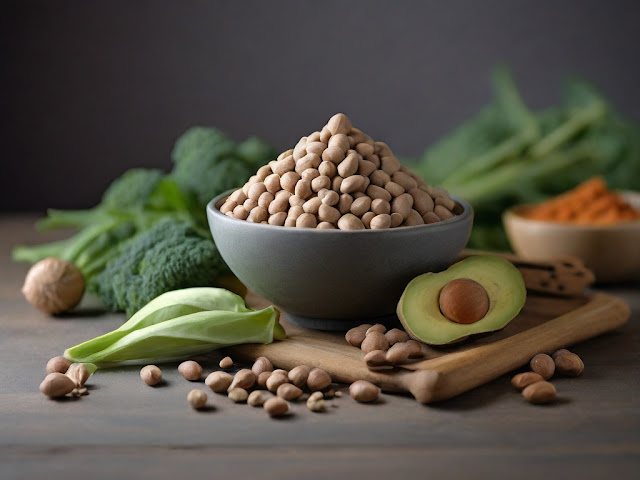Plant-based Protein: The Best, the Worst, and Everything In Between
With the growing popularity of plant-based diets, there's increasing interest in plant-based protein sources as alternatives to animal products. Plant-based proteins offer numerous health benefits, including lower saturated fat and cholesterol content, while also being environmentally sustainable. However, not all plant-based proteins are created equal. This comprehensive guide explores the best, the worst, and everything in between when it comes to plant-based protein sources, helping you make informed choices for a balanced and nutritious diet.
Understanding Plant-based Protein:
Plant-based protein refers to protein derived from plant sources such as legumes, grains, nuts, seeds, and certain vegetables. Unlike animal proteins, which contain all essential amino acids, most plant-based proteins are considered incomplete proteins, meaning they lack one or more essential amino acids. However, by combining different plant-based protein sources, individuals can obtain all essential amino acids and meet their protein needs.The Best Plant-based Protein Sources:
Legumes:
Legumes such as beans, lentils, chickpeas, and peas are excellent sources of plant-based protein. They are also rich in fiber, vitamins, minerals, and antioxidants. Examples include:- Black beans: High in protein and fiber, black beans are versatile and can be used in soups, salads, tacos, and more.
- Lentils: Rich in protein and iron, lentils come in various varieties such as green, red, and black, and can be used in soups, stews, curries, and salads.
- Chickpeas: Also known as garbanzo beans, chickpeas are high in protein and fiber and can be used to make hummus, roasted snacks, curries, and salads.
Quinoa:
Quinoa is a complete protein, meaning it contains all nine essential amino acids. It's also rich in fiber, vitamins, and minerals, making it a nutritious addition to any plant-based diet. Quinoa can be used as a base for salads, stir-fries, grain bowls, and side dishes.Soy Products:
Soy products such as tofu, tempeh, and edamame are complete protein sources that offer a wide range of health benefits. They are also rich in calcium, iron, and other nutrients. Examples include:- Tofu: Made from soybeans, tofu is a versatile ingredient that can be used in stir-fries, soups, sandwiches, and desserts.
- Tempeh:Fermented soybeans, tempeh has a nutty flavor and firm texture, making it suitable for grilling, sautéing, and marinating.
- Edamame: Young soybeans, edamame can be enjoyed as a snack, added to salads, stir-fries, or soups.
Seeds:
Seeds such as chia seeds, hemp seeds, flaxseeds, and pumpkin seeds are rich in protein, healthy fats, and essential nutrients. They can be sprinkled on top of salads, yogurt, oatmeal, or blended into smoothies for an extra protein boost.
The Worst Plant-based Protein Sources:
While most plant-based protein sources offer health benefits, some may be less nutritious or less environmentally sustainable than others. The worst plant-based protein sources include:Highly Processed Foods:
Highly processed plant-based foods such as vegan burgers, sausages, and imitation meats may be high in sodium, additives, and preservatives. They may also lack essential nutrients and fiber compared to whole food sources.Sugary Snacks and Treats:
Many plant-based snacks and treats, such as vegan cookies, cakes, and candies, are high in sugar, refined flour, and unhealthy fats. While they may be vegan-friendly, they offer little nutritional value and may contribute to weight gain and poor health.Plant-based Junk Foods:
Plant-based junk foods such as potato chips, French fries, and sugary cereals may be vegan-friendly but are often high in calories, unhealthy fats, and artificial additives. They should be consumed in moderation as part of a balanced diet.
Finding Balance with Plant-based Protein:
To maximize the health benefits of plant-based protein, aim for a variety of protein sources and incorporate whole, minimally processed foods into your diet. Experiment with different legumes, grains, nuts, seeds, and soy products to ensure you're getting a diverse array of nutrients and amino acids. Additionally, pay attention to portion sizes and be mindful of added sugars, unhealthy fats, and excessive sodium in packaged and processed plant-based foods.Plant-based protein offers a wealth of health benefits and can be a nutritious and sustainable option for individuals following a plant-based diet. By choosing nutrient-dense sources such as legumes, quinoa, soy products, and seeds, and minimizing highly processed and junk foods, you can meet your protein needs while promoting overall health and well-being. Remember to prioritize variety, balance, and whole foods to optimize the nutritional quality of your plant-based diet and enjoy the many benefits it has to offer.



Post a Comment
0Comments